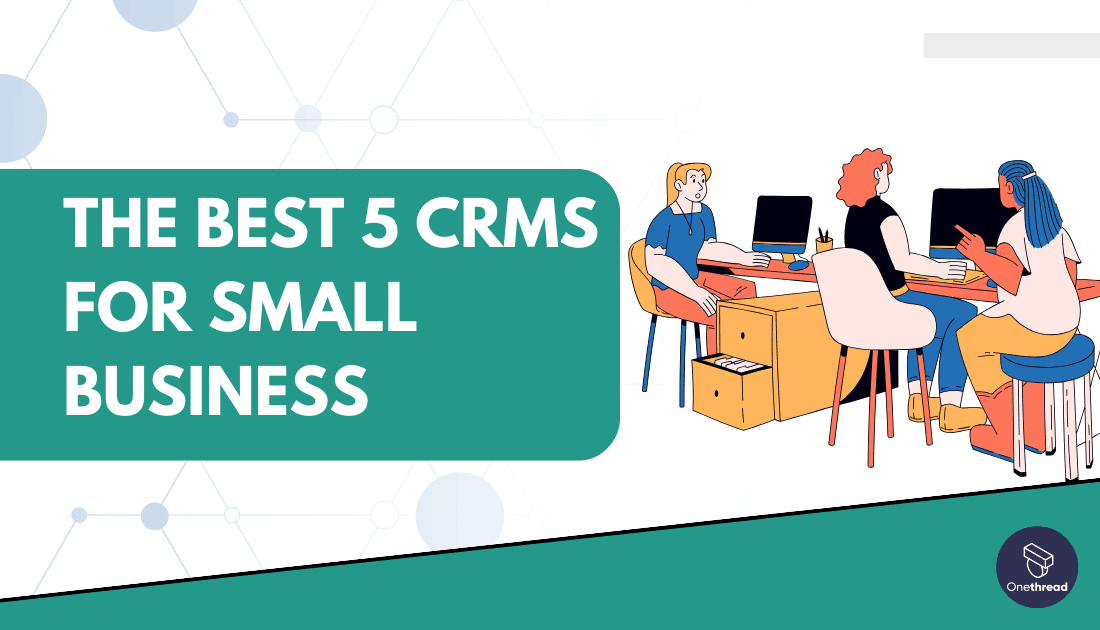A study by Hubspot found that 40% of sales experts report that their CRM system significantly enhances the coordination between their sales and marketing divisions. In 2023, the need for efficient Customer Relationship Management (CRM) tools has never been more crucial.
Get ready to embark on a journey to discover the top 5 CRMs tailor-made for small businesses in this article. These digital allies will help you streamline your interactions, nurture leads, and ultimately, supercharge your growth.
Whether you’re a budding startup, a local shop, or a creative agency, we’ll introduce you to the tools to turn your customer relationships into a powerful driving force for success.
Quick List of 5 CRMS for Small Business
- Salesforce: Leading CRM software provider for businesses.
- HubSpot CRM: A user-friendly platform offering sales, marketing, and service tools in one.
- Zoho CRM: Tailored for small businesses, it focuses on capturing leads and streamlining operations.
- Pipedrive: A sales-focused CRM designed for easy tracking of conversations and deals.
- Honeybook: Combines CRM and project management, ideal for businesses looking for a holistic approach.
Our reviewers evaluate software independently. Clicks may earn a commission, which supports testing. Learn how we stay transparent & our review methodology
Comparison Chart Of CRMS for Small Business
Here’s a comparison chart of CRM solutions for small businesses
CRM/Features | Client Profiles & Tracking | Lead Management | Customer Data Analytics | Template & Document Management |
 | In a single view Client's or household's financial past, present, and future | Managing your leads in a systematic and structured manner | Analytics dashboard with lead and sales insights, Predictive analytics | Document storage and management, File Manager, Template Manager |
 | Comprehensive client profiles; Interaction timeline | Full lead tracking & nurturing; Deals pipeline | Detailed analytics on sales, marketing, and customer service | Built-in templates for emails, sales documents, and more |
 | Detailed client profiles; Interaction history & scoring | Lead capture, scoring, and conversion to deals | Advanced analytics with AI-assisted insights & custom reports | Document library, email templates, and document builder |
 | Clear visualization of client deals & communication | Visual sales pipeline; Customizable stages | Customizable sales analytics & forecasting | Document storage, link tracking, and customizable templates |
 | Client profiles linked to projects & financials | Integrated lead capture & tracking with projects | Assumed: Basic client and project analytics | File storage, branded templates for contracts, invoices & more |
What Are CRMS for Small Business?
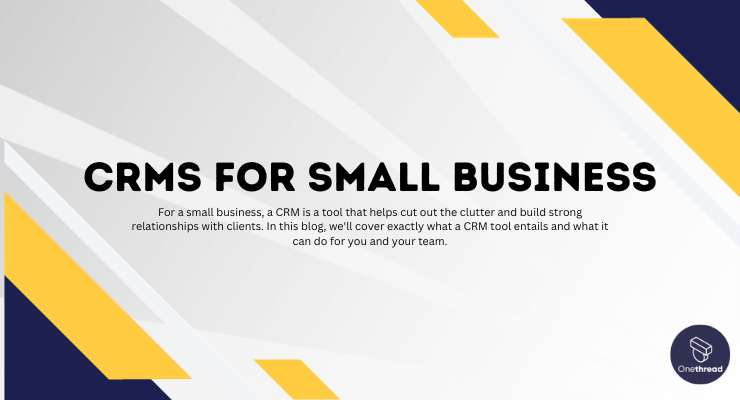
CRM stands for Customer Relationship Management. In the context of small businesses, CRM refers to tools or software solutions tailored to help these enterprises manage their interactions with customers. Imagine a personal assistant who remembers every detail about your friends. From birthdays to the last conversation you had with them.
The best ATS for small businesses is like having a dedicated assistant for your recruitment process. It doesn’t just remember basic details; it recalls past purchases, preferences, interactions, and potential future needs.
Just as you’d rely on an assistant to improve and maintain friendships, businesses use CRM to nurture and enhance customer relationships. With the right CRM, even the smallest business can manage its customers as efficiently as a large corporation.
Why CRMS for Small Business Is Important to Your Business?
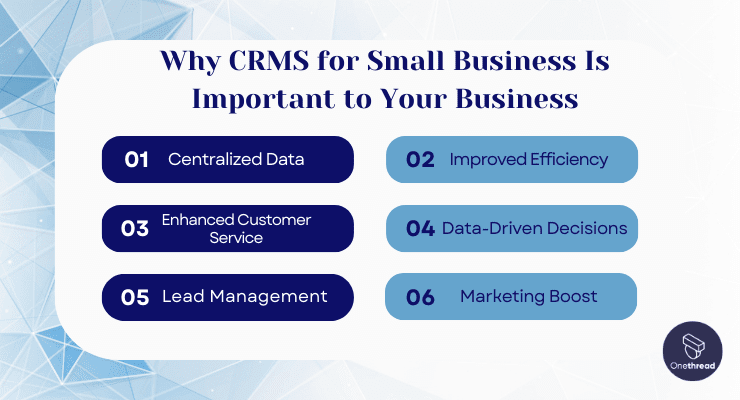
In today’s competitive market, success and stagnation often differ in how well a business manages its customer relationships. This is where CRM for small businesses becomes vital.
- Centralized Data: Store customer information in one place, making it easier to access and update.
- Improved Efficiency: Automate tasks, reducing time spent on manual data entry.
- Enhanced Customer Service: Track customer interactions, ensuring consistent and personalized service.
- Data-Driven Decisions: Analyze sales and customer data to make informed business choices.
- Lead Management: Identify potential clients and track sales progress.
- Marketing Boost: Target campaigns based on customer data, improving engagement and ROI.
With CRM, even small-scale businesses can operate with the precision and insight of industry giants.
Key Features to Consider in CRMS for Small Business
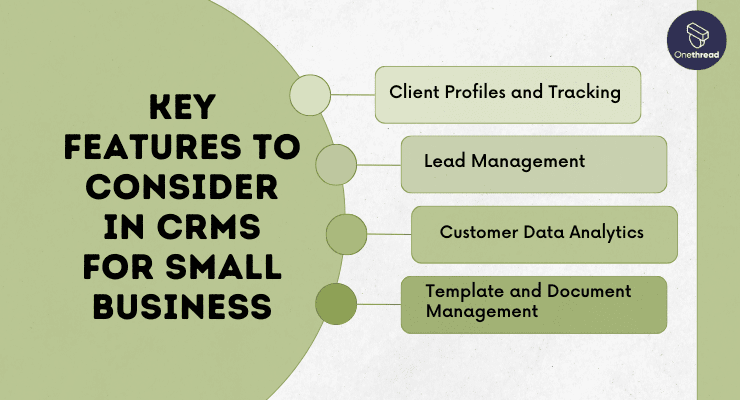
Selecting the right CRM solution is pivotal in managing your small business effectively. Consider these key features when making your choice.
Client Profiles and Tracking
An essential feature to consider is client profile creation and tracking. This feature lets you store detailed client information in one centralized database, including contact details, preferences, and interaction history.
It essentially acts as a hub where you can view all pertinent information about a customer, facilitating personalized service and fostering stronger relationships.
Lead Management
A robust lead management system aids in tracking potential customers from the first point of contact through the conversion process. It helps prioritize leads based on their potential, ensuring that high-value leads are not lost in the shuffle.
Moreover, it facilitates efficient lead delegation, promotes streamlined operation, and enhances the chances of conversion.
Customer Data Analytics
Customer data analytics is about leveraging data to better understand your clientele and make informed decisions. This feature provides insights into customer preferences and behaviors, helping you tailor your offerings and marketing strategies accordingly.
It involves various analytics tools to dissect big data into actionable insights, offering a substantial edge in market competition.
Template and Document Management
For a small business, time is a vital resource. The template and document management feature allows you to efficiently create, store, and manage essential documents.
Be it sales contracts, proposals, or emails, this feature helps in maintaining a repository of templates that can be readily used, saving time and ensuring consistency in your communications. Additionally, it aids in organizing documents logically, making retrieval quick and straightforward.
Top 5 CRMS for Small Business
Enter CRM systems – designed to centralize, optimize, and enhance customer interactions. If you’re a small business aiming for growth, the right CRM can be your game-changer.
Dive in as we unravel the top 5 CRMs tailored for the needs of small businesses. Let’s find your perfect match.
#1. Salesforce
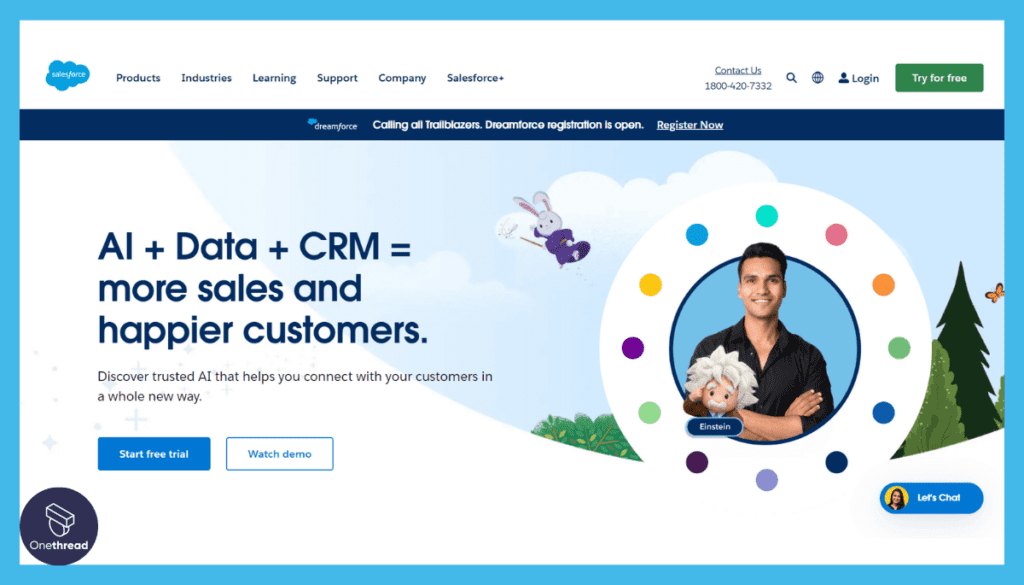
Salesforce, a top-notch CRM system for small businesses, offers robust tools to streamline customer relationships. Its user-friendly interface simplifies contact management, sales tracking, and customer support.
Salesforce helps small businesses make informed decisions with customizable features and insightful analytics. Communication is seamless through email integration and task management.
Salesforce offers scalability, allowing businesses to grow without system limitations. Trusted globally, it enhances sales and customer service efficiency. Salesforce is the go-to choice for small businesses seeking a reliable CRM solution to nurture customer relationships and drive growth.
Salesforce Overview
Company Valuation and Employee Numbers:
- $197.30 billion as of October 1, 2023.
- 79,390 (2023)
Founding Team:
- Marc Russell Benioff is the co- founder of salesforce.
Features
Lead and Contact Management
Salesforce excels in managing leads and contacts. You can easily track interactions and categorize leads based on their potential value. For freelancers, this is crucial for prioritizing efforts and focusing on high-value clients.
Sales Forecasting
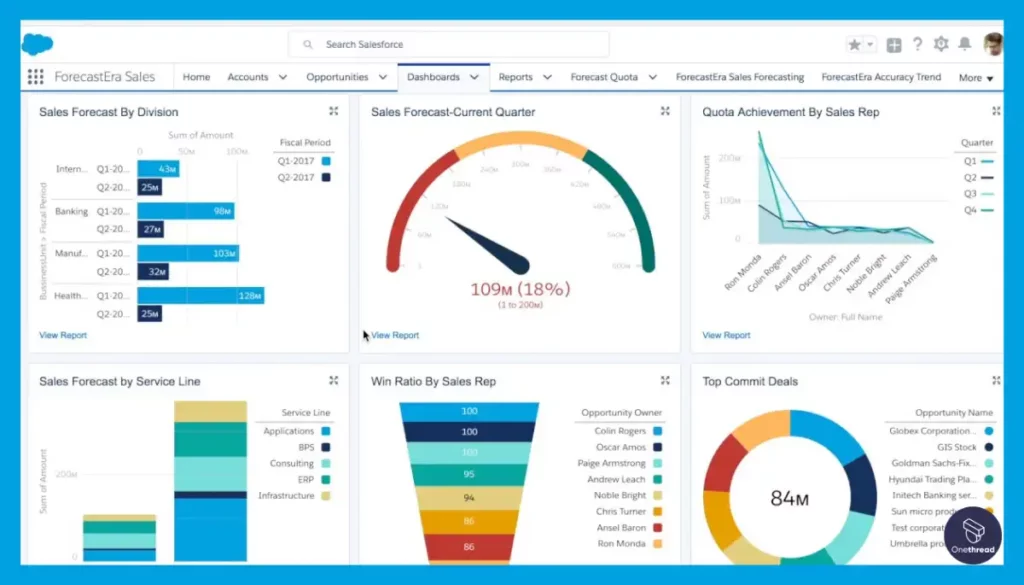
on Salesforce offers robust sales forecasting features. You can predict future sales trends based on past data. This is invaluable for planning and resource allocation for small businesses and freelancers.
Email Integration
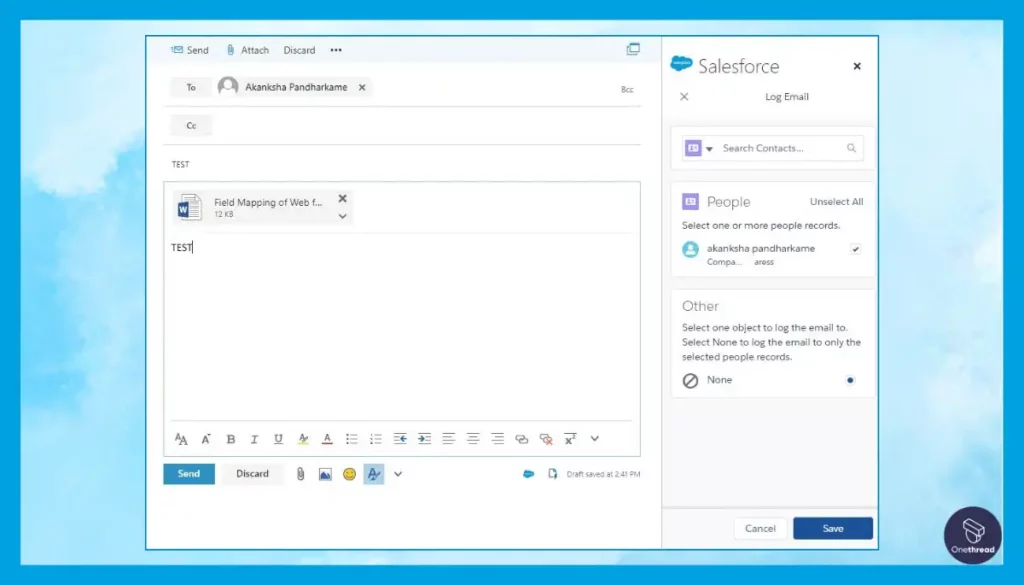
Salesforce allows seamless email integration. You can sync your email with Salesforce to track interactions and set reminders. For freelancers, this means no more switching between platforms to manage customer communications.
Customization
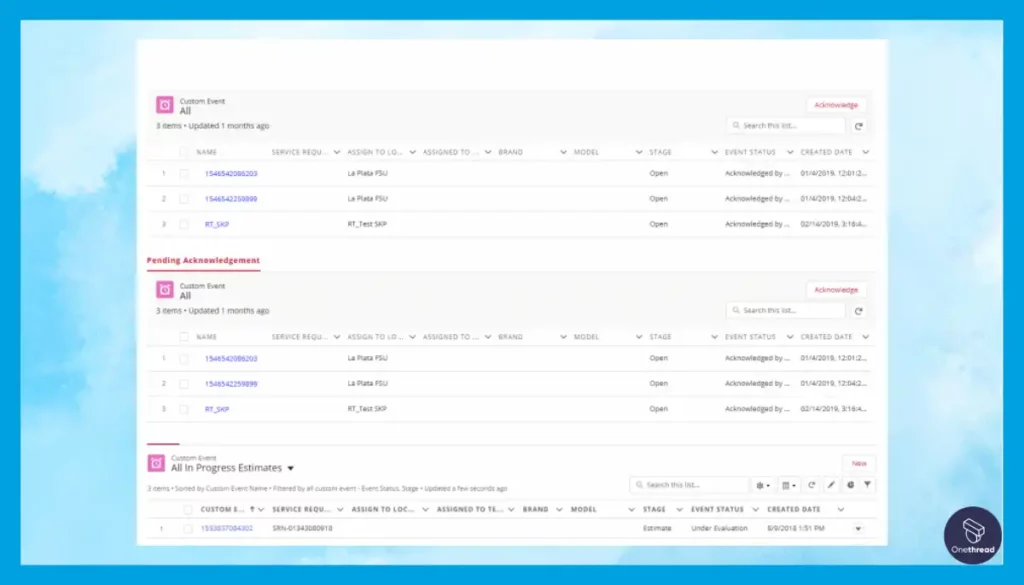
Salesforce is highly customizable. You can tailor the platform to fit your specific business needs. This is particularly useful for freelancers who have unique requirements for customer management.
Extensive App Ecosystem
Salesforce offers various third-party apps through its AppExchange. This allows you to extend the platform’s capabilities. For small businesses and freelancers, this means you can add specific functionalities as your business grows.
Pros and Cons
Pros:
- Comprehensive lead and contact management
- Accurate sales forecasting
- Seamless email integration
- High level of customization
- Extensive third-party app support
Cons:
- Can be complex for beginners
- Pricing can be steep for small businesses
- Some features require additional plugins
Pricing Plans
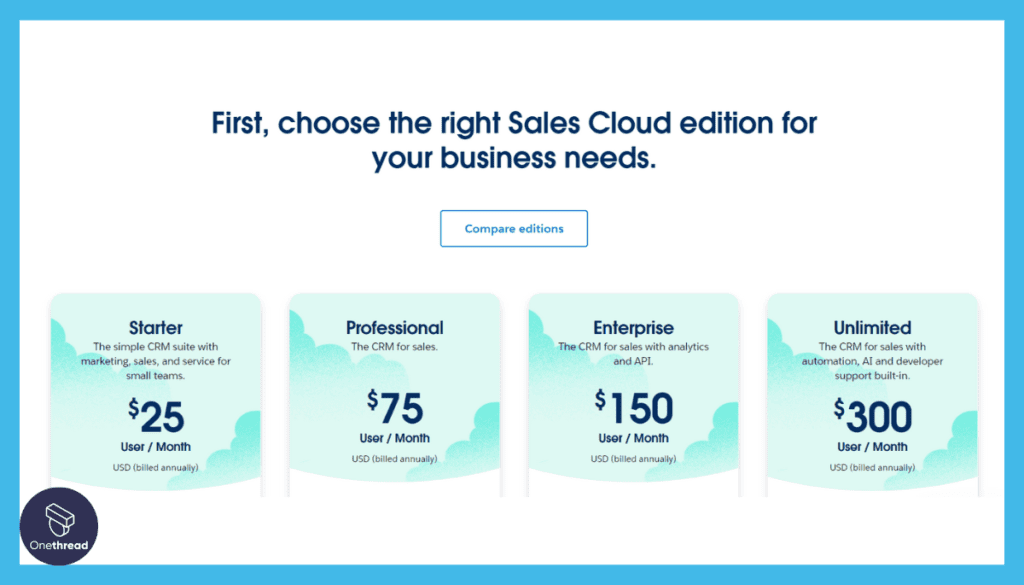
- Essentials: $25/user/month
- Basic CRM features
- Professional: $75/user/month
- Complete CRM for any size team
- Enterprise: $150/user/month
- Deeply customizable CRM
Customer Ratings
- G2: 4.2 out of 5 stars
- Capterra: 4.3 out of 5 stars
Review
It centralized customer data, streamlining communication and improving sales and service efficiency.
The extensive range of third-party integrations enhances its functionality. We find the reporting and analytics tools powerful for tracking performance.
However, Salesforce’s pricing can be a major hurdle, especially for small businesses. Customization, while powerful, can also be complex, requiring expertise.
Salesforce is a top-notch CRM system with powerful features for managing customer relationships and business operations. It excels for larger enterprises, but the cost and complexity may not suit smaller companies. Careful consideration of your business needs and budget is essential when evaluating Salesforce.
Ready to explore other options to Salesforce? These project management tools present a range of possibilities.
#2. HubSpot CRM
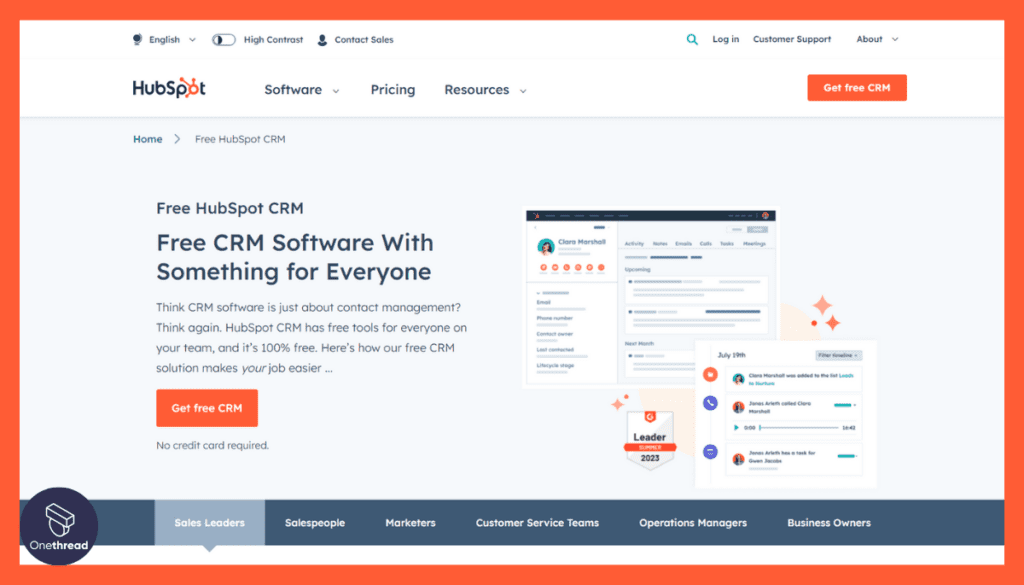
HubSpot CRM is a user-friendly and credible customer relationship management (CRM) software designed to streamline your business operations. Its easy-to-read interface empowers businesses to manage contacts, track interactions, and nurture leads effectively.
This CRM offers a centralized platform for organizing customer information, ensuring that you have a clear view of your client interactions. Its intuitive tools enable you to automate routine tasks, saving time and reducing errors.
What sets HubSpot CRM apart is its seamless integration with marketing and sales tools, allowing you to create targeted campaigns and track their success. Plus, it offers valuable analytics to help you make data-driven decisions.
HubSpot CRM- Overview
Product Information:
- Company Valuation: as of September 15, 2023 is $25.59B.
- Employee Numbers: 7,433
Founding Team:
- Brian Halligan:
- Position: Co-founder and President.
Features
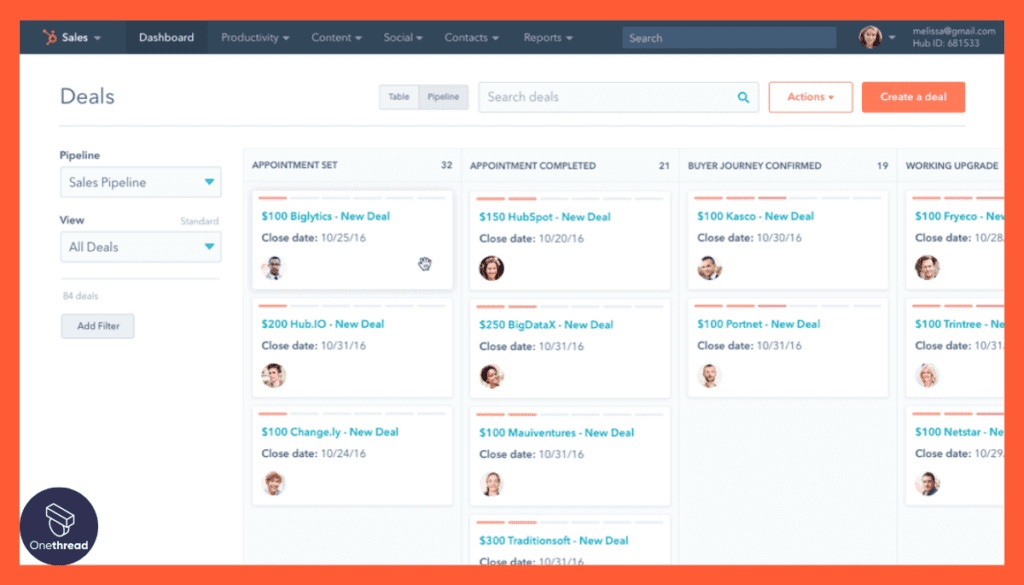
Its intuitive design, combined with many features, positions it as a frontrunner in the industry. Let’s delve into the nuances of what makes HubSpot CRM a standout choice.
User-Friendly Interface
HubSpot CRM is designed with the user in mind. Its clean, intuitive interface ensures even those new to CRM can easily navigate. Customizable dashboards ensure businesses get a quick overview of the metrics that matter most to them. Every module, whether sales or marketing, is readily accessible, ensuring tasks are completed swiftly without unnecessary clicks.
Comprehensive Sales Tools
With HubSpot, sales processes become a breeze. The CRM provides tools for businesses to track sales interactions, manage pipelines, and automate repetitive tasks. It’s like having a digital sales assistant that works around the clock. These tools also offer insights into which strategies work and which need rethinking, driving sales effectiveness to new heights.
Marketing Integration
HubSpot isn’t just a CRM; it’s a holistic platform that integrates seamlessly with marketing efforts. This means businesses can manage email campaigns, landing pages, and lead nurturing within the same environment. The beauty lies in the seamless transition of leads from marketing to sales, ensuring no potential client falls through the cracks.
Service and Support Hub
Customer service is integral, and HubSpot acknowledges that. Their service hub allows businesses to manage customer queries, feedback, and support tickets efficiently. The tool ensures every customer feels heard and valued, fostering brand loyalty and facilitating repeat business.
Pros & Cons:
Pros:
- Integrates sales, marketing, and service tools in one platform.
- Offers extensive personalization options to cater to unique business needs.
- HubSpot Academy provides resources and training for businesses to get the most out of the platform.
Cons:
- While it offers a free version, advanced features come at a higher price.
- Due to its extensive features, initial setup and mastery might take time for some users.
Pricing Plans:
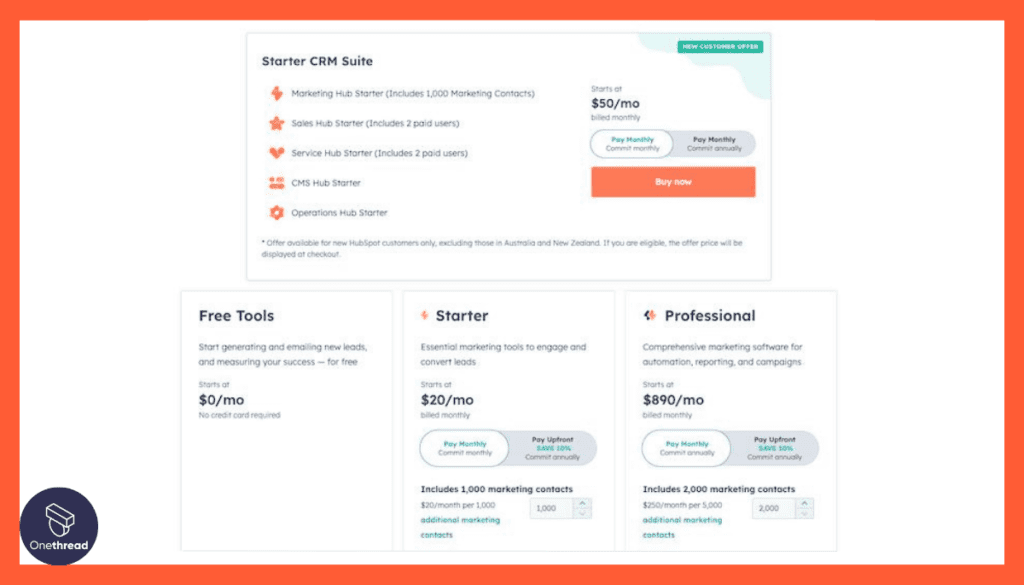
- Free Plan: Basic CRM functionalities, contact management, and email marketing.
- Starter: Starting at $45/month, it includes basic marketing tools and ad management.
- Professional: Starting at $450/month, offers automation, advanced sales analytics, and custom reporting.
- Enterprise: Starting at $1,200/month, designed for larger teams with advanced features and integrations.
Customer Ratings:
- G2: 4.3 out of 5 stars from over 2,500 reviews.
- Capterra: 4.2 out of 5 stars based on more than 3,000 reviews.
Review
HubSpot CRM is popular for businesses seeking a customer relationship management solution. Its strengths lie in its user-friendly interface and comprehensive features. It offers contact management, email marketing, and sales automation tools, making it a one-stop solution for many businesses.
On the downside, some users have found the pricing to be on the higher side, especially for smaller businesses. Additionally, while HubSpot CRM is robust, it may lack some advanced customization options in other CRM systems.
HubSpot CRM is a solid choice for businesses looking to streamline their sales and marketing efforts. However, potential users should carefully consider their budget and specific customization needs before committing to this platform.
Considering alternatives to HubSpot CRM? These project management platforms offer various alternatives.
#3. Zoho CRM
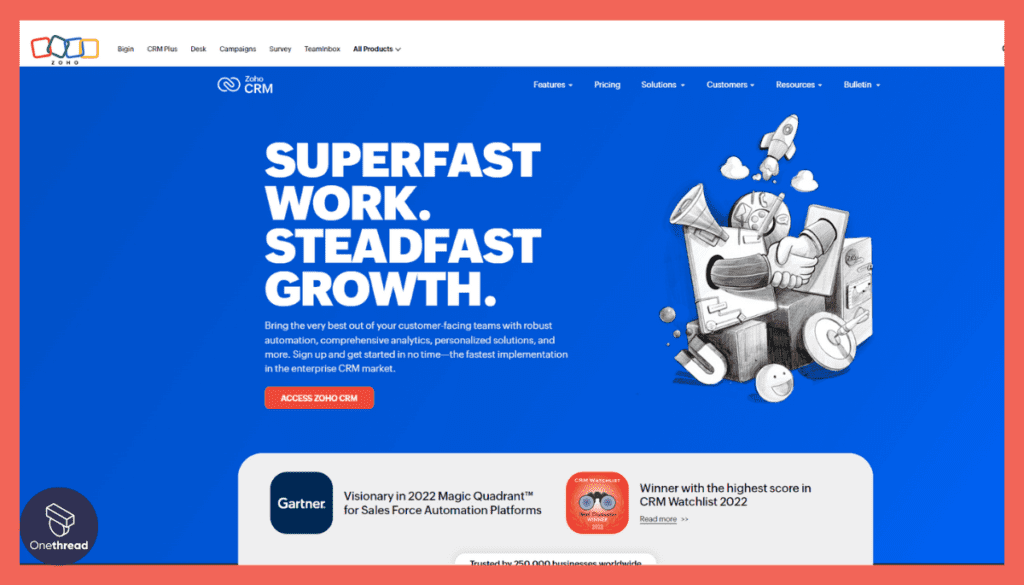
Zoho CRM is a user-friendly and credible customer relationship management (CRM) software that enhances your business efficiency. Its easy-to-read interface provides a powerful platform for managing contacts, tracking interactions, and optimizing lead nurturing.
This CRM simplifies data management, ensuring a clear view of customer interactions. It offers automation tools that save time and minimize errors, allowing you to focus on more critical tasks.
Zoho CRM’s extensive integration capabilities with other business tools make it stand out, enabling you to create customized workflows and enhance productivity. It also provides insightful analytics to aid informed decision-making.
Zoho CRM- Overview
Product Information:
- Company Valuation: USD 570.7 million
- Employee Numbers: 12,000+
Founding Team:
Sridhar Vembu and Tony Thomas Founder of Zoho.l
Features
Its blend of robust features, matched with its small-business-friendly approach, makes it a compelling choice for enterprises looking for growth. Dive in with us as we explore the intricate facets of Zoho CRM.
Multichannel Communication
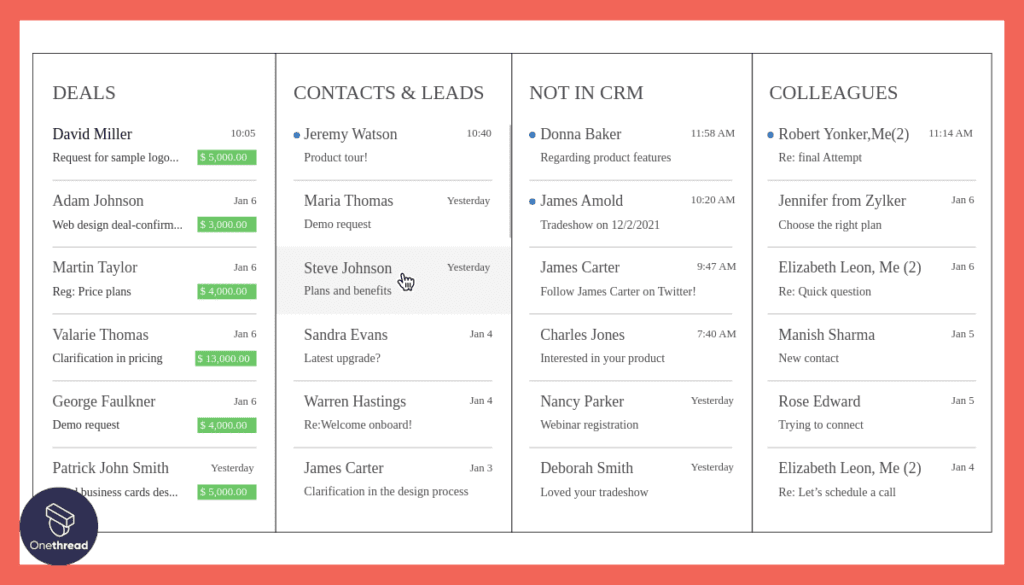
Zoho CRM stands tall with its multichannel capabilities. Businesses can interact with clients via email, phone, live chat, and even social media, all within a single platform. This ensures consistent communication, tracking every touchpoint and offering customers a seamless experience irrespective of their chosen communication channel.
Advanced Analytics and Reporting
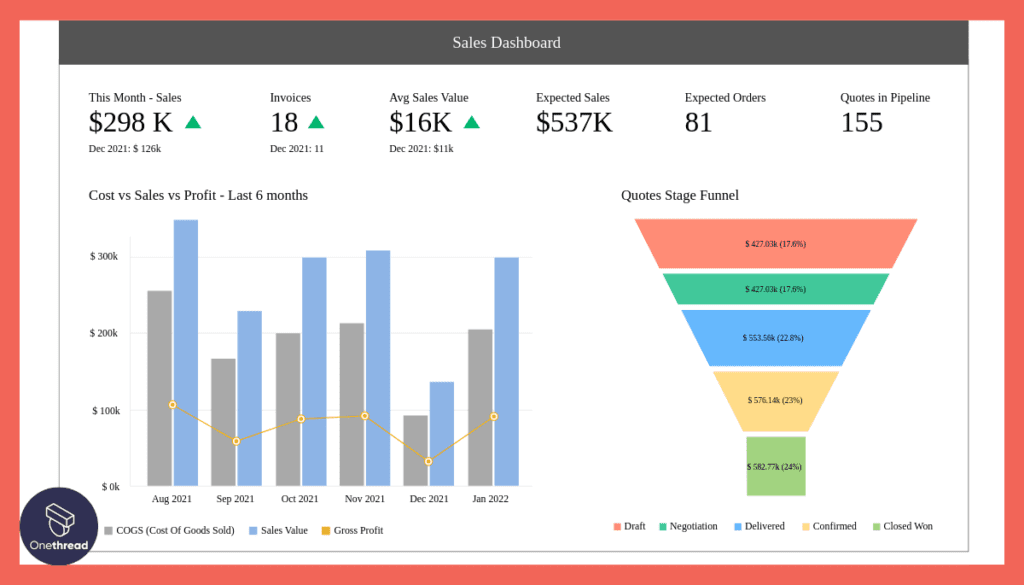
Harness the power of data with Zoho’s comprehensive analytics module. Dive deep into sales trends, team performance, or customer behavior. Customizable dashboards offer businesses a bird’s-eye view of operations, while detailed reports provide insights to make informed, strategic decisions, maximizing ROI.
AI-Powered Sales Assistant – Zia
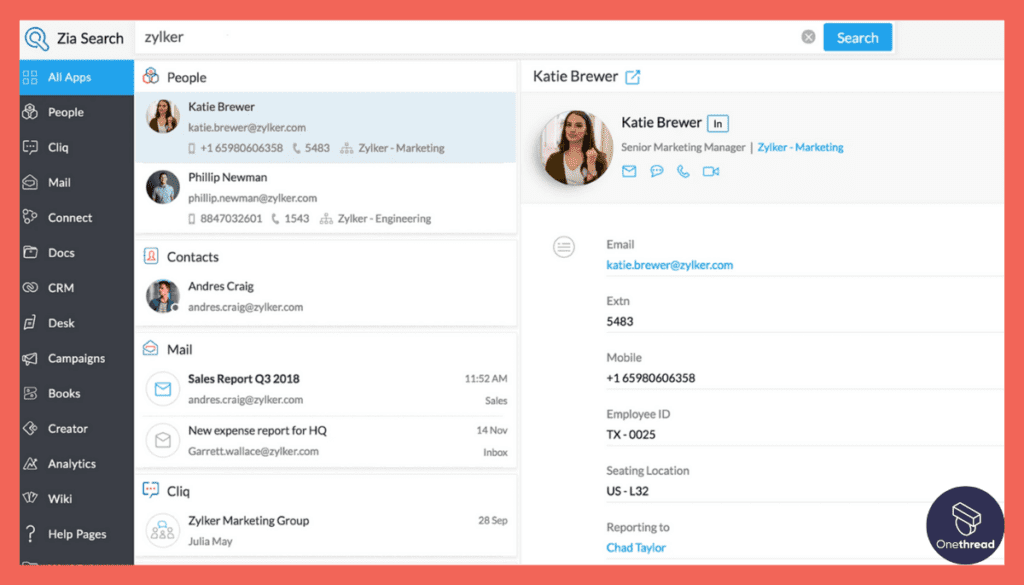
Meet Zia, Zoho’s AI-powered sales assistant. Zia analyzes the data you feed into your CRM to predict sales trends, detect anomalies, and even suggest optimal times to contact leads. This AI integration ensures businesses stay ahead of the curve, confidently making data-driven decisions.
Workflow Automation
Free up precious time with Zoho CRM’s workflow automation. From sending follow-up emails to assigning leads to the right team member, mundane tasks are taken care of. This means businesses can focus on what they do best while Zoho manages the repetitive yet crucial backend operations.
Customization and Integration
Every business is unique. Recognizing this, Zoho CRM offers extensive customization options. Whether it’s modules, fields, or layouts, tailor the CRM to fit the business mold. Plus, with many integration options, businesses can connect other vital tools, ensuring a unified, efficient ecosystem.
Pros & Cons:
Pros:
- Extensive customization options to fit unique business needs.
- Competitive pricing structure designed for businesses of all sizes.
- As businesses grow, Zoho can adapt, offering small and large features for enterprises.
Cons:
- With a vast array of features, the initial learning phase can be steep.
- While it offers numerous integrations, some niche tools might not be supported.
Pricing Plans:
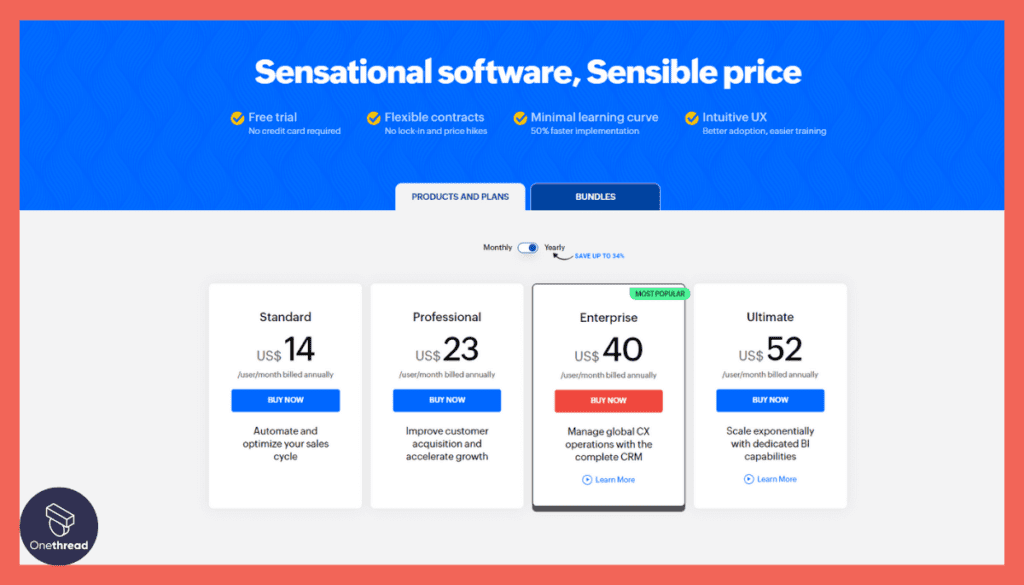
- Standard: At $14/user/month, covers essential CRM features like lead, contact, and deal management.
- Professional: At $23/user/month, introduces inventory management and enhanced analytics.
- Enterprise: At $40/user/month, offers multi-user portals, advanced customization, and BI tools.
- Ultimate: At $52/user/month, includes all Enterprise features plus Zia’s AI-powered capabilities.
Customer Ratings:
- G2: 4.0 out of 5 stars from over 1,000 reviews.
- Capterra: 4.2 out of 5 stars based on more than 2,000 reviews.
Review
Zoho CRM is a versatile customer relationship management system offering various features. Its strengths include an affordable pricing structure, making it accessible to businesses of all sizes. The platform provides tools for contact management, sales automation, and analytics.
However, some users have reported a steeper learning curve than other CRMs, which might require additional training for effective use. Additionally, the user interface, while functional, may not be as intuitive as some competitors.
Zoho CRM is a cost-effective solution with a robust feature set. Still, potential users should be prepared to invest time in learning its intricacies, and the user interface may not be as user-friendly as some alternatives.
Want to switch things up from Zoho CRM? Discover diverse project management tools for your needs.
#4. Pipedrive
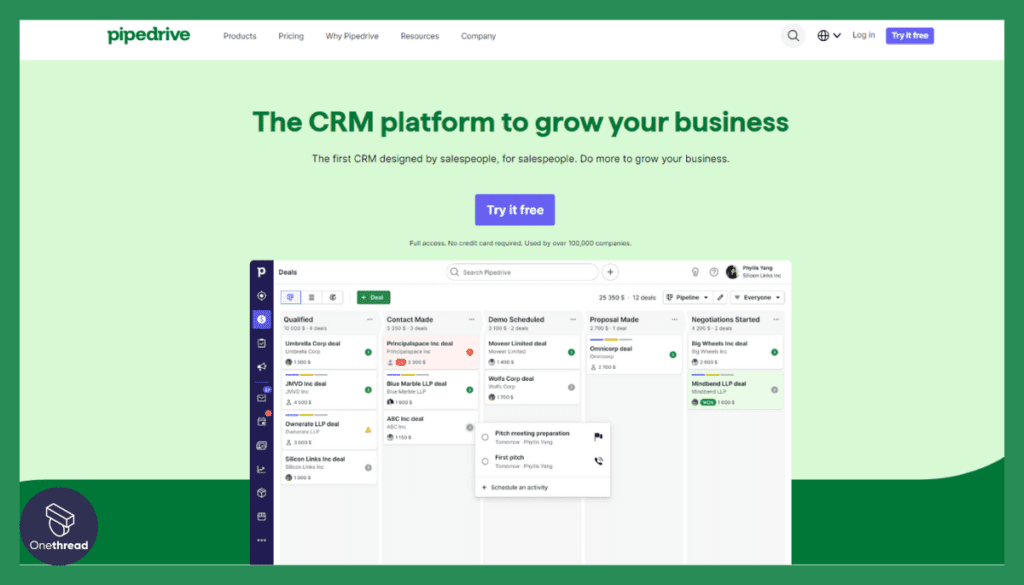
Pipedrive is a credible and user-friendly sales management tool that simplifies business operations. Its easy-to-read interface empowers businesses to manage leads, track deals, and streamline sales processes effectively.
This software provides a centralized platform for organizing your sales pipeline, ensuring you can visualize and prioritize your sales opportunities. With its intuitive features, you can automate repetitive tasks, saving time and reducing errors.
Pipedrive is a trustworthy solution that enhances sales management. Its user-friendly design and credible performance make it an excellent choice for businesses of all sizes. Say goodbye to unnecessary complexity – Pipedrive is here to streamline your sales efforts precisely.
Pipedrive – Overview
Product Information:
- Company Valuation: $1.5 billion
- Employee Numbers: more than 1,000 employees
Founding Team:
- Timo Rein, Urmas Purde, Ragnar Sass, Martin Henk, and Martin Tajur are the Founder of Pipedrive.
Features
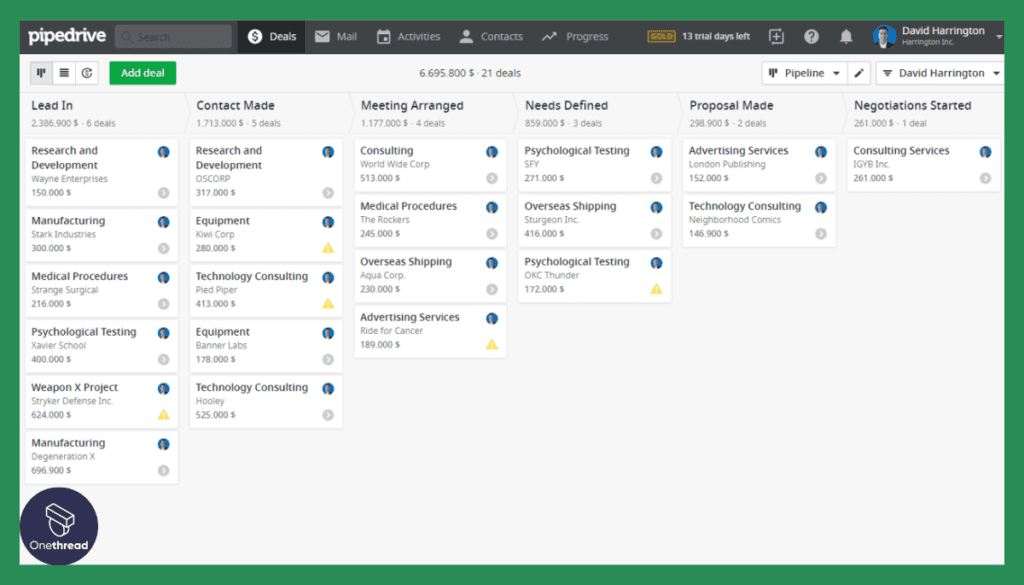
Its prime focus on sales processes and user-centric design makes it a top pick for businesses eager to streamline operations and boost revenue. Join us in uncovering the features and functionalities that set Pipedrive apart.
Visual Sales Pipelines
Pipedrive brings sales data to life with its visual sales pipelines. Users can easily drag and drop deals between stages, ensuring a tangible progression feel. At a glance, businesses can pinpoint bottlenecks, track deal stages, and gauge the overall health of sales operations, all in real time.
Email Integration and Automation
Keeping track of sales emails becomes a breeze with Pipedrive. Directly integrate your email with the platform, ensuring no communication slips through. Moreover, the tool automates follow-up reminders, tracks email open rates, and categorizes emails, offering users a holistic, organized view of their communications.
Customizable Web Forms
Gone are the days of manual lead entry. With Pipedrive’s customizable web forms, businesses can automatically pull in leads from websites. Every form submission translates into a new deal or contact within the CRM, ensuring businesses capture every potential opportunity without manual intervention.
Performance Analytics and Reporting
Harness the power of data with Pipedrive’s robust analytics module. Generate detailed sales reports, track revenue projections, and understand team performance. Such insights empower businesses to recalibrate strategies, set clear goals, and maintain consistent growth trajectories.
Marketplace Integrations
Pipedrive’s Marketplace is a treasure trove of integrations. Whether businesses need marketing automation, customer support tools, or e-signature solutions, Pipedrive covers them. Such integrations mean businesses can create a cohesive tech stack centered around their CRM.
Pros & Cons:
Pros:
- Intuitive design ensures users can hit the ground running.
- With mobile apps, manage sales on the go.
- Pipedrive boasts a responsive customer support team and a plethora of online resources.
Cons:
- While perfect for small businesses, larger enterprises may find feature limitations.
- Some popular tools may require third-party integrations.
Pricing Plans:
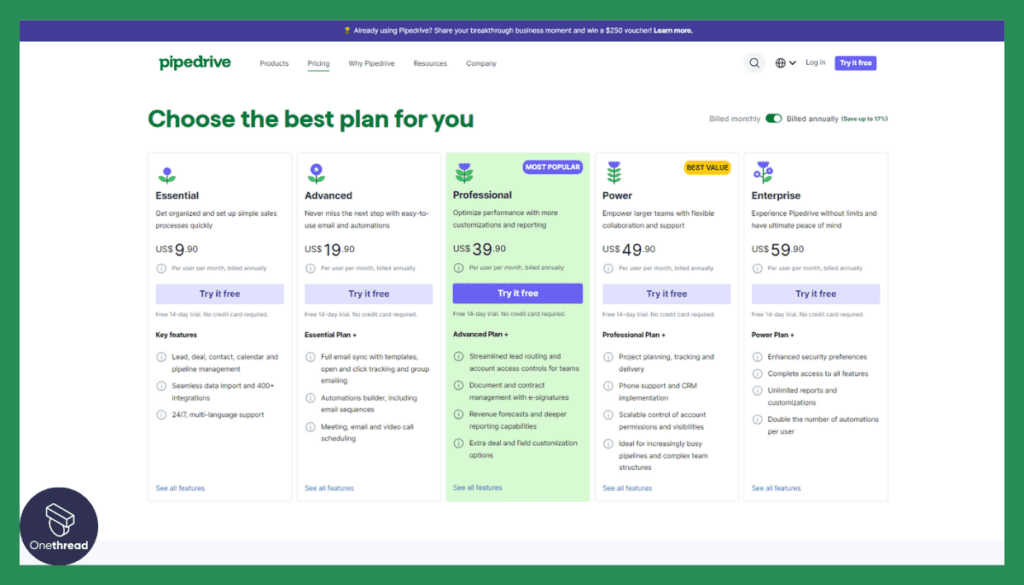
- Essential: At $12.50/user/month, provides basic CRM functionalities and email integration.
- Advanced: At $24.90/user/month, introduces workflow automation and email tracking.
- Professional: At $49.90/user/month, it offers team management features and revenue forecasting.
- Enterprise: At $99/user/month, tailored for larger teams with custom onboarding and advanced support.
Customer Ratings:
- G2: 4.3 out of 5 stars from over 2,000 reviews.
- Capterra: 4.4 out of 5 stars based on more than 1,500 reviews.
Review
Pipedrive is a well-regarded CRM system known for its simplicity and focus on sales pipeline management. Its strengths lie in its intuitive interface and ease of use, making it an excellent choice for sales teams. The platform offers effective sales automation features, customizable pipelines, and robust reporting tools.
On the downside, some users have found that Pipedrive lacks some of the more advanced CRM features offered by competitors. Additionally, pricing can be a concern for smaller businesses, as the more advanced features may require higher-tier plans.
Pipedrive is a straightforward and user-friendly CRM solution, ideal for businesses prioritizing sales pipeline management. However, potential users should carefully assess their specific CRM needs and budget, as more advanced features may come at a higher cost.
In need of options beyond Pipedrive? Explore these project management solutions to find the right fit.
#5. Honeybook
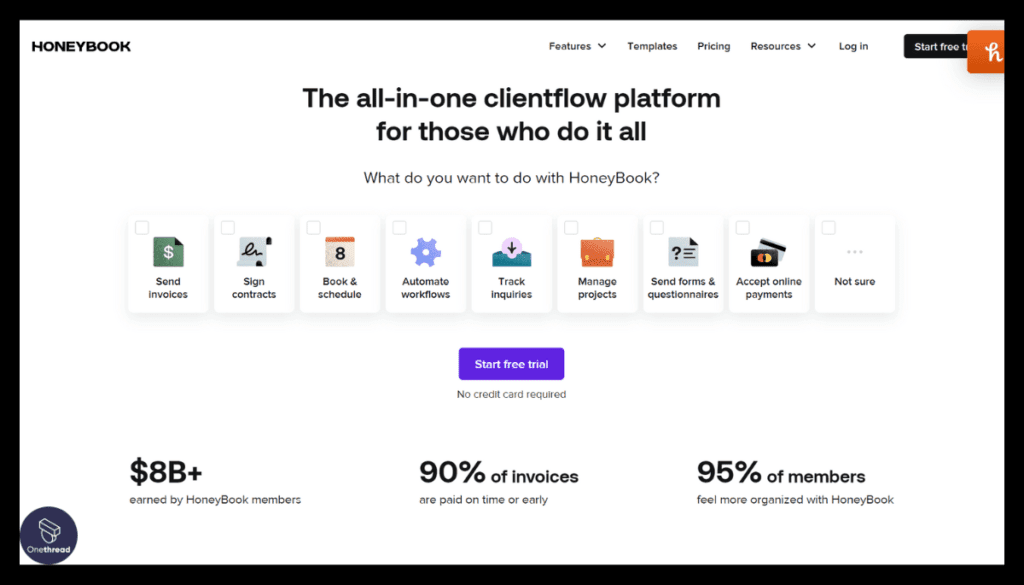
HoneyBook is a credible and user-friendly business management platform designed to simplify your workflow. With its easy-to-read interface, it empowers entrepreneurs and professionals in creative fields to manage projects, book clients, and handle finances efficiently.
This platform provides a centralized hub for organizing projects, ensuring you stay on top of deadlines and client communications. HoneyBook’s user-friendly features help automate administrative tasks, saving you valuable time.
What sets HoneyBook apart is its ability to streamline client interactions, from initial inquiry to payment, with customizable proposals and contracts. It also offers powerful financial tools for tracking income and expenses, simplifying tax season.
HoneyBook – Overview
Product Information:
- Company Valuation: $2.4 billion.
- Employee Numbers: 103 employees.
Founding Team:
- Oz Alon:
- Position: Founder and President.
Features
From the moment a lead gets in touch to project completion and payment, every interaction is meticulously tracked. This 360-degree client view ensures businesses nurture relationships, anticipate needs, and always deliver standout experiences.
Integrated Project Management
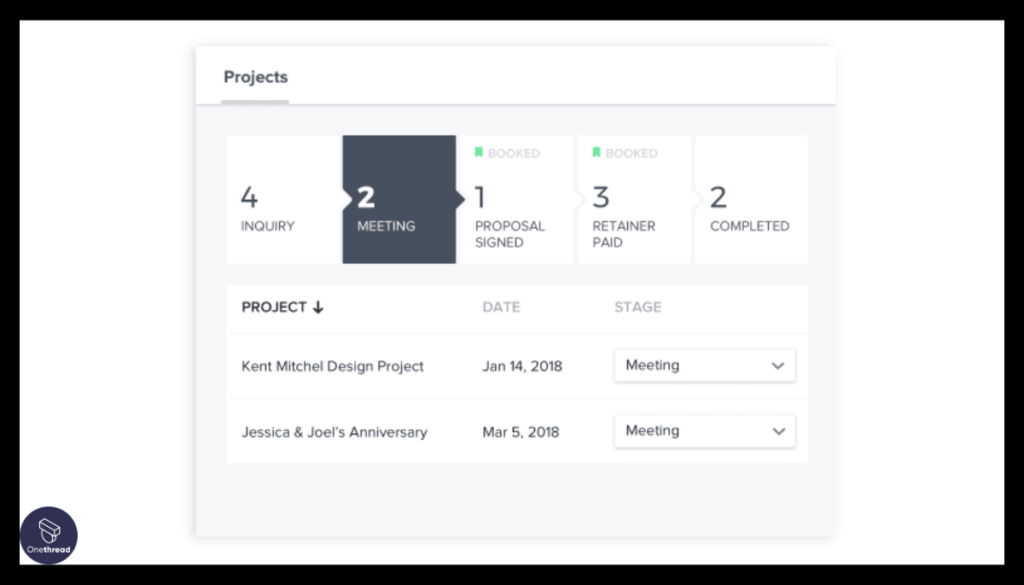
Beyond its CRM capabilities, Honeybook excels in project management. Users can set milestones, assign tasks, and monitor progress all in one place. This fusion of CRM and project management ensures no detail is missed, leading to efficient workflows and satisfied clients.
Automated Workflow and Templates
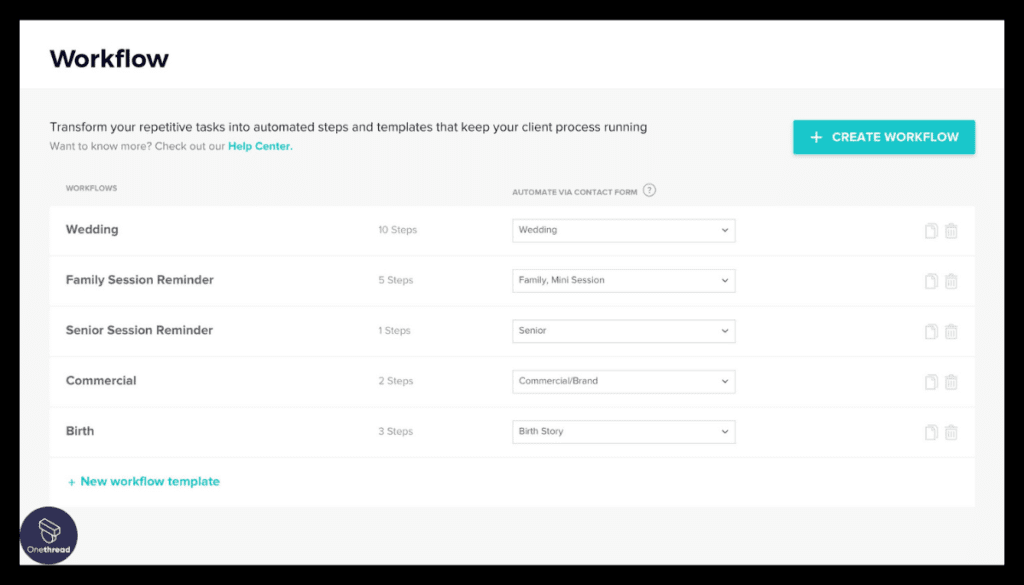
Save time and maintain brand consistency with Honeybook’s automation tools. From contract templates to invoice reminders, automate routine tasks. This boosts efficiency and ensures a consistent brand experience for clients at every touchpoint.
Online Payments and Financial Tracking
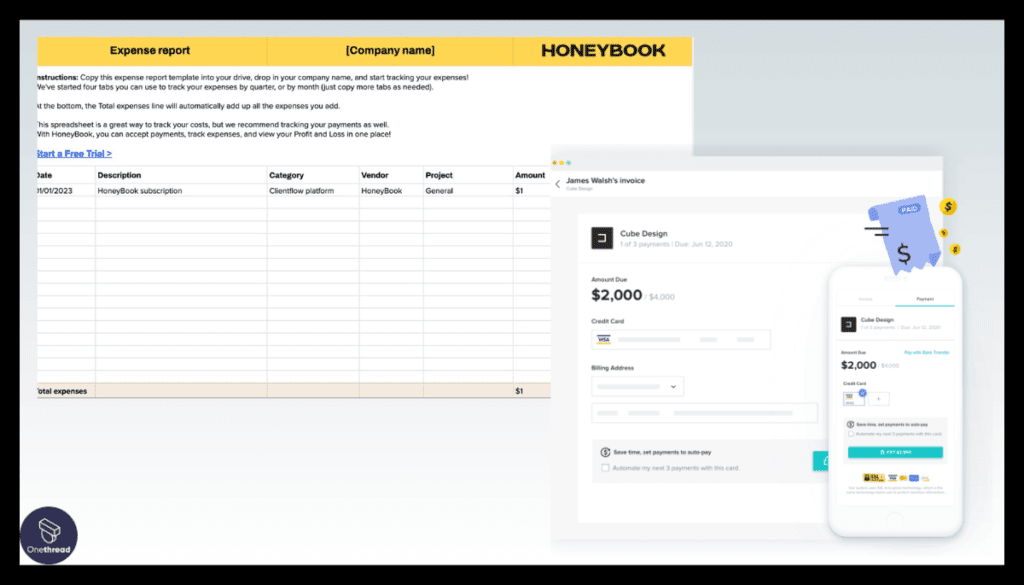
Financial dealings are a breeze with Honeybook. The platform supports online payments, making it easy for clients to settle invoices. Plus, its financial tracking ensures businesses have a clear picture of their revenue, expenses, and pending payments in real time.
Collaboration and Communication Tools
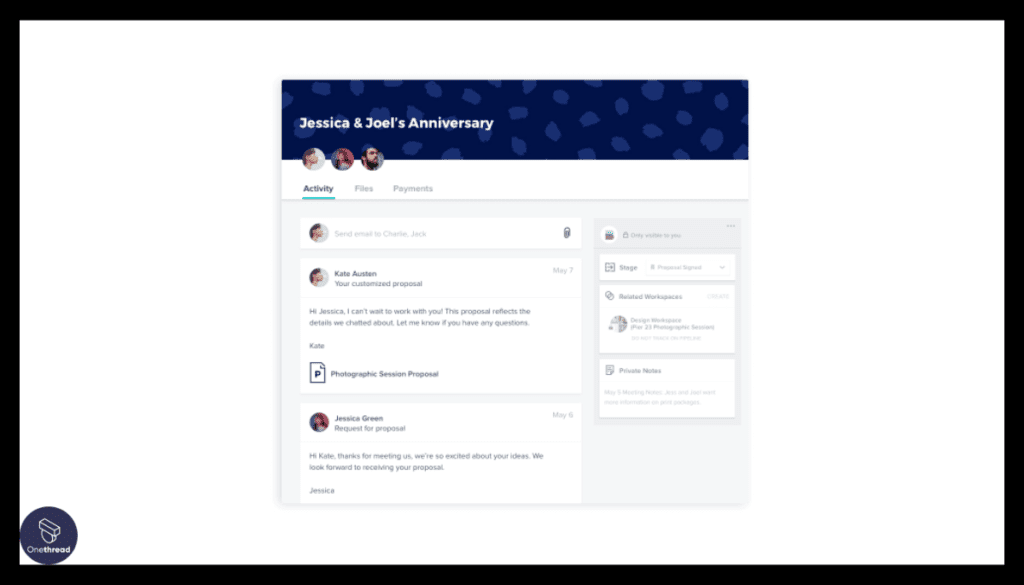
Honeybook promotes team synergy. Built-in communication tools allow teams to discuss projects, share updates, and make collective decisions. The result? Smooth project execution, with everyone on the same page.
Pros & Cons:
Pros:
- Combines CRM and project management, reducing the need for multiple tools.
- Offers clients a dedicated space to view project status, documents, and communications.
- Integrates with popular tools like Gmail, Calendly, and Zapier.
Cons:
- While comprehensive, some small businesses might find the pricing steep.
- With its myriad of features, new users may need time to navigate the platform effectively.
Pricing Plans:
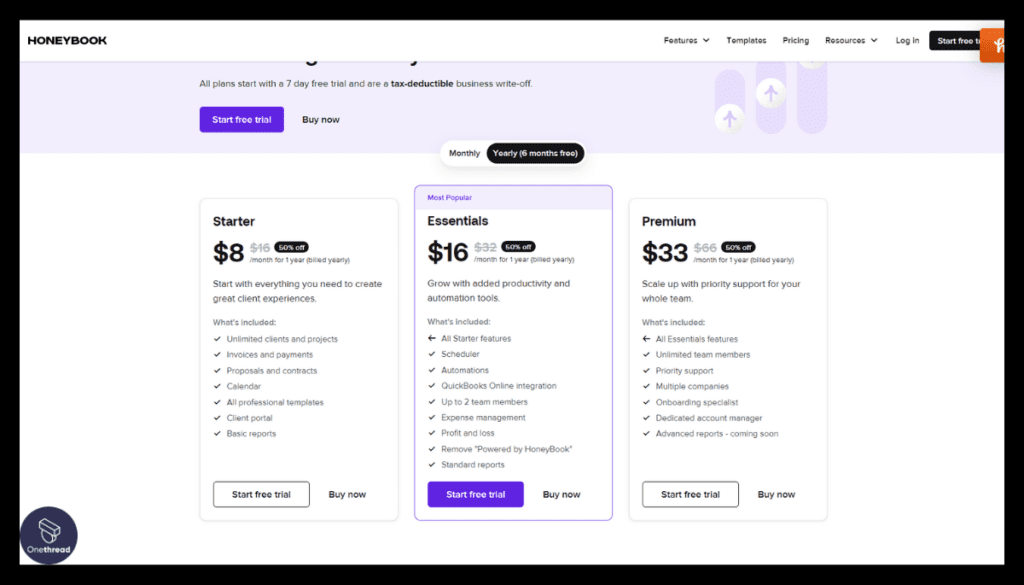
- Starter: At $9/month, designed for solopreneurs with basic CRM and project management needs.
- Professional: At $39/month, extends features like automated workflows and premium support.
- Premier: At $69/month, offers the full suite of features, ideal for growing teams.
Customer Ratings:
- G2: 4.5 out of 5 stars from over 300 reviews.
- Capterra: 4.7 out of 5 stars based on more than 500 reviews.
Review
Honeybook is a popular CRM and project management platform designed for creative professionals and small businesses. Its strengths include user-friendly templates for proposals, contracts, and invoices, streamlining the client management process. The platform also offers features for task management and document sharing, promoting collaboration.
However, some users have found Honeybook to be somewhat limited in its customization options, which may not cater to businesses with highly unique workflows. Additionally, the pricing, while reasonable for its target audience, may not be the most cost-effective choice for all businesses.
Honeybook excels in simplifying client management for creative professionals but may not offer the same level of customization as more versatile CRMs. Prospective users should consider their specific business needs and budget before committing to this platform.
Searching for a Honeybook alternative? Dive into these project management tools for a multitude of choices.
Getting the Most Out of CRMS for Small Business
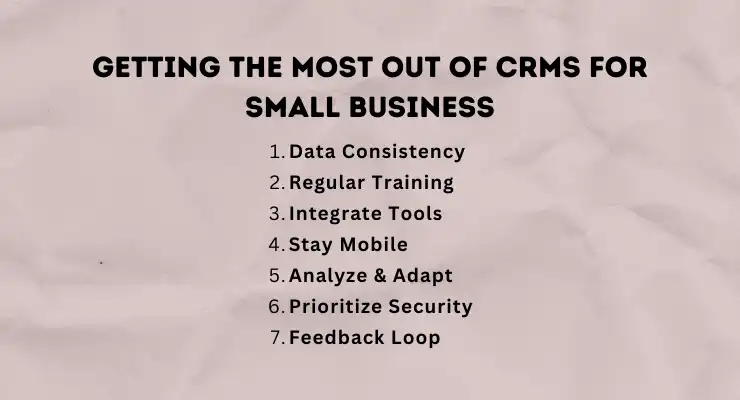
CRMS, or Customer Relationship Management Systems, are powerful tools for small businesses. But to truly harness their potential, knowing the best practices is crucial. Here’s a quick guide to maximize your CRM experience:
- Data Consistency: Ensure data entry is uniform. Consistent information aids in accurate analysis.
- Regular Training: Keep your team updated with regular CRM training sessions.
- Integrate Tools: Connect your CRM with other business tools for a seamless workflow.
- Stay Mobile: Use CRM mobile apps to access data on-the-go.
- Analyze & Adapt: Regularly review CRM analytics to identify areas of improvement.
- Prioritize Security: Protect customer data with strong security measures.
- Feedback Loop: Encourage team feedback to refine CRM usage continually.
By following these practices, businesses can optimize their CRM usage, ensuring efficient operations and enhanced customer relationships.
Conclusion
CRMS for small businesses offers more than just organization; it’s the backbone of effective customer relationship management. Embracing this tool can lead to improved operations, deeper customer insights, and a competitive edge in the market. Invest in a quality CRM solution, and watch your business flourish.
FAQs
How much does a typical CRMS cost?
The cost varies. Some CRMS offer free basic plans, while premium features might require monthly or annual subscriptions. It’s essential to compare different providers to find a solution within your budget.
How secure is my data in a CRMS?
Reputable CRMS providers prioritize data security with encryption, two-factor authentication, and regular backups. However, always review a platform’s security protocols before committing.
Is it challenging to switch from one CRMS to another?
While there’s a learning curve when adopting a new system, many CRMS providers offer data migration tools and support to ease the transition.
Do I need a dedicated team to manage CRMS?
Not necessarily. Modern CRMS are user-friendly. However, for larger implementations or custom features, having a dedicated person or team can be beneficial.
